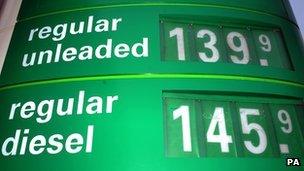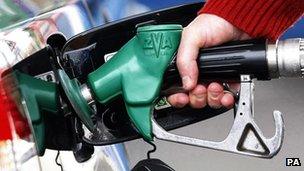Fuel prices: Raise or reduce? Your views
- Published
- comments

A group of motorists are planning to lobby MPs to call for a cut in fuel duty.
The campaign group Fair Fuel UK says petrol and diesel are at record high prices and must fall to help families and businesses during the economic downturn.
BBC News website readers discuss the effects of fuel prices.
First, Michael de Podesta argues for a rise in fuel costs and Russ Gladwish explains why he thinks prices should decrease.
Michael de Podesta in London

Sadly, petrol prices need to rise further in order to make the economic cost of using a car match the ecological cost.
Having built an infrastructure over 50 years on the assumption of cheap fuel, we now need to spend the next 50 years working with different assumptions.
The amount of carbon dioxide in the atmosphere is phenomenal. There is some uncertainty around the affect of emissions but it is a big cause for concern.
I don't think people are bad when using fuel for their cars. I have a car but I don't drive it very much. I live relatively close to work so I know that I am lucky in that respect.
I have sympathy for people who are concerned about the rise in fuel cost and I know petrol is essential to our economy.
But for me it is the difference between the ecological cost and the economic cost.
Currently, I don't think petrol is expensive enough to make us change our way of life and become more ecological. It's very cheap, about 20p a mile, and it is cheaper than public transport.
We need to decide if we would like more cars and consume more fuel or do we need to focus on using less fuel and emit less carbon dioxide.
Fuel could either be rationed or the price of it could increase.
It seems fair that the more fuel you use, the more it should cost.
Therefore, I think that increasing fuel prices is a good policy because if people know that prices will stay high, then it would encourage businesses to seek alternatives, and encourage people to drive less.
Russ Gladwish in Norfolk

How are rural dwellers supposed to cope? The trouble is that public transport is practically non-existent.
I work about 21 miles away from home, and my son and daughter both need to be dropped at work.
My daughter works only five miles away and she can get a bus to work, but when she finishes work there are no buses to take her back home.
I have a 1.9 diesel car and when filled it up recently it cost £99.96 - that's about a third of my weekly wage, or 20% of my income.
If I spent 10% on indoor fuel, I would be classed as being in fuel poverty.
It's not the fault of fuel companies - we all know most of the cost is fuel duty.
The government has milked the cow dry and are now damaging business and families to rake in the cash.
I have no disposable income for going out socially. I use the car for work and shopping. I don't know what more I can do.
I think fuel duty should be reduced substantially while income tax should rise.
This is fairer as the cash can be used by everyone, so everyone should pay. It will also reduce costs for businesses and help the economy.
More views
I can no longer afford the petrol costs of running my family car every day to work, so I've done the calculations and I've bought a small city car to reduce my cost of getting to work. Public transport is not an option for anyone living and/or working outside of a major city, so the cost of petrol/diesel is a critical factor in choosing a job nowadays.Dave, Southampton
High fuel costs do not impact my driving costs as I own an electric car. It may take close to 11 hours to drive the 280 miles to Norwich but it cost only £2.80 for the initial charge at home as the required three rapid charges are free for now. However the high price of fuel affects every other aspect of my life as it pushes up prices for everything else.Mark Tebbutt, Lancashire
We run a powerboat school and marine centre, the high price of fuel, both petrol and diesel is hitting us hard! Fuel is essential to our business, and we have to pass the price of fuel onto our customers, and we are getting fewer and fewer of those due to prices. What can a small business do?B Clough, Wiltshire
I would support the price rises in fuel if the UK would have an efficient and effective alternative public transport system not just for personal journeys but for the transport of freight, postal service etc. We need to make public transport the convenient and cheap option, rather than making both petrol prices and tickets for other forms of transport sky high!Gizella Hughes, Manchester
These high prices just mean I don't go out as often. Being disabled and having a small motability car it only gets used for essential trips these days: shopping, hospital and doctors appointments. It means no socialising or social visits to family/friends. Just another step towards being even more isolated which is crazy.Brian Turner, Lichfield, Staffordshire
I have tried to reduce car use in my household for environmental reasons, but the price of fuel is now a far greater impetus for us to do so. Regrettably, high fuel prices lead to higher prices on the shelves so I find myself in a quandary. The government has no comprehension at all of how the working man lives. Three pence a litre maybe nothing to millionaires, but to me, it's food from my children's mouths.Paul Reid, Stockport
Diesel has been 149.9p here, which is due to the costs of shipping and distributing to the Isle of Man. I would imagine the 1.50p barrier will be broken shortly and then will continue to climb - people depend on cars more on the island due to the limited public transport and small, rural areas, and there is limited competition to keep prices under control.Phil Dickson, Ramsey, Isle of Man
As usual the prices spike at the slightest whiff of a tension in the Middle East, even though nothing has actually happened yet, and reserves have already been set aside to cover any short-term shortage in production. The cost of petrol didn't fall in proportion to the fall in crude over the last few years since its peak! This is unsustainable. Someone is ripping us off.Dave, Belfast, Northern Ireland
This whole situation is getting out of hand and the government is standing idly by - well not quite idly as they are rubbing their hands as the duty and tax rolls in to treasury coffers. Increases in fuel prices affect everyone and leads to increased food and commodity prices when many are struggling to stay afloat.John Welsby, Bathgate, Scotland